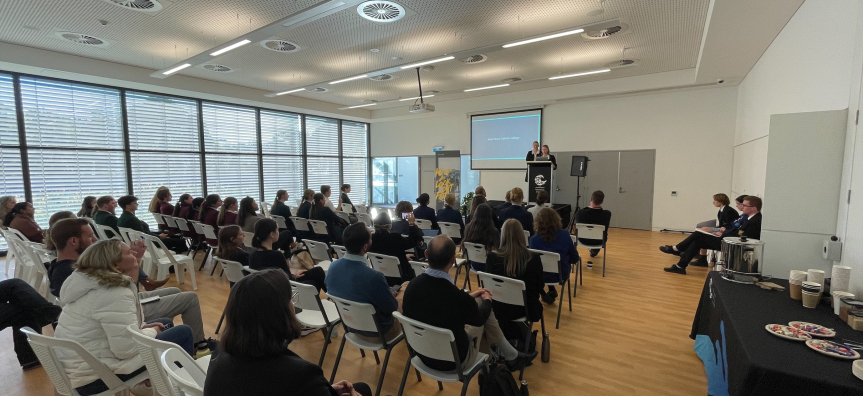
Meet our writer: Sam is an 18 year old journalism student studying at UTS and currently serving his second term in Councils Youth Advisory Group (YAG). As a member of our YAG Sam was invited to the Have Your Say Day, a forum developed by a newly formed Northern Beaches School Captains network, proudly supported by Council.
Northern Beaches student leaders have outlined the big four issues facing young people, and are calling for urgent action.
Students identified mental health, climate change, teacher shortages, and educational discrepancies between rural and metro areas as the major problems that need to be addressed by all levels of governments.
On June 10, students from nine Northern Beaches schools gathered at Dee Why PCYC for the inaugural ‘Have Your Say Day’ (HYSD), a student-organised forum where school leaders gather to express their concerns over what they see as the major issues in their school communities to local government members, and to offer solutions to the problems.
Dr Sophie Scamps, federal member for Mackellar, Rob Stokes and James Griffin, state members for Pittwater and Manly respectively, and Northern Beaches mayor Michael Regan were in attendance, listening to student presentations.
1. Mental Health
Mental health was the most prominent topic from students as they outlined a lack of accessibility as a key barrier for young people seeking help, and the urgent need for more mental health support in schools and the community.
“Mental health is a key component of overall health and wellbeing, however, there is simply just not enough support regarding these challenges,” said Lily, 17.
Emily, 17, said “Access to community and youth services for young people has, over time, been identified as a significant barrier as the majority of these services are not easily accessible to youth.”
Students said that the stigma surrounding mental health and the lack of support services prevented many students from seeking help, even when they need it.
Students offered solutions to the issue such as discrete and centralised pop-up mental health clinics around the Northern Beaches, more funding for additional counsellors and external support services in schools, or shortened school days, which had already been introduced at Pittwater High School to great effect.
2. Climate Change
With the growing threat of climate change exemplified by the increase in severe bushfires and floods in recent times, young people are understandably worried about what the future holds.
Students revealed large amounts of ecoanxiety within young people on the Northern Beaches as a result of the climate emergency.
Jess, 17, said that “There is no denying that our generation faces, and will continue to face, more exposure to world events than any other generation has before.
“Climate change is on our door. The effects are taking place now.”
The same sentiment was shared between all schools discussing this issue; we want to help.
Schools came up with a variety of creative initiatives to help fight climate change at their schools. Initiatives included second-hand fashion stalls at lunch time, upgrading bins to be enclosed, and the development of an app where students from schools across the state can submit their environmental plans for other schools to be inspired by and incorporate others into their own schools.
According to the students however, the onus for climate action is still on the government.
Northern Beaches Council has developed the Protect. Create. Live Northern Beaches Environment and Climate Change Strategy 2040, and have been working to make the community more sustainable, including moving all Council sites to 100% renewable energy as of January 2021.
3. Teacher Shortages
Teacher shortages were a major issue amongst students as they cited the lack of teachers as detrimental to their education.
All the school leaders attending HYSD are undertaking their HSC, meaning quiet spaces to study and available teachers are a priority for them.
Hannah, 17, says “the acceleration of teacher shortages demonstrates its [the education system’s] culpability to inaction.
“Inaction that dissuades rather than encourages those students from excelling at school… Complacency leads to inaction.”
One student shared how multiple classes get moved to their library because there aren’t enough teachers to cover them all, creating a disruptive environment that prevents senior students from effectively studying.
Another student revealed that, for his HSC English class, he had had three straight classes of a student to teacher ratio of 60:1.
Students proposed better pay and the reinstatement of the Diploma of Education as options to incentivise teaching for young people, as many are already dissuaded by the current drawbacks.
4. Educational Discrepancy between Rural and Metro Schools
Students spoke about the challenges of learning in rural communities, including the difficulties of online learning but with a significantly worse internet connection.
Hugh, told the story of his teacher’s trip to Gundagai, a town 150km west of Canberra.
“She discovered that not only did this teacher teach English, but also filled in as a history and business studies teacher, despite having zero experience in either subject.
“Imagine as a student, your passions are say geography or visual arts, but your ability to pursue these passions as subjects are limited, your interest in school will no doubtedly decrease.”
Students proposed online resources where students from metro areas can donate the notes they have, and the establishment of sister school programs which would strengthen links between rural and metro areas.
All the MPs in attendance thought HYSD was a great initiative and were very open to future forums being held.
